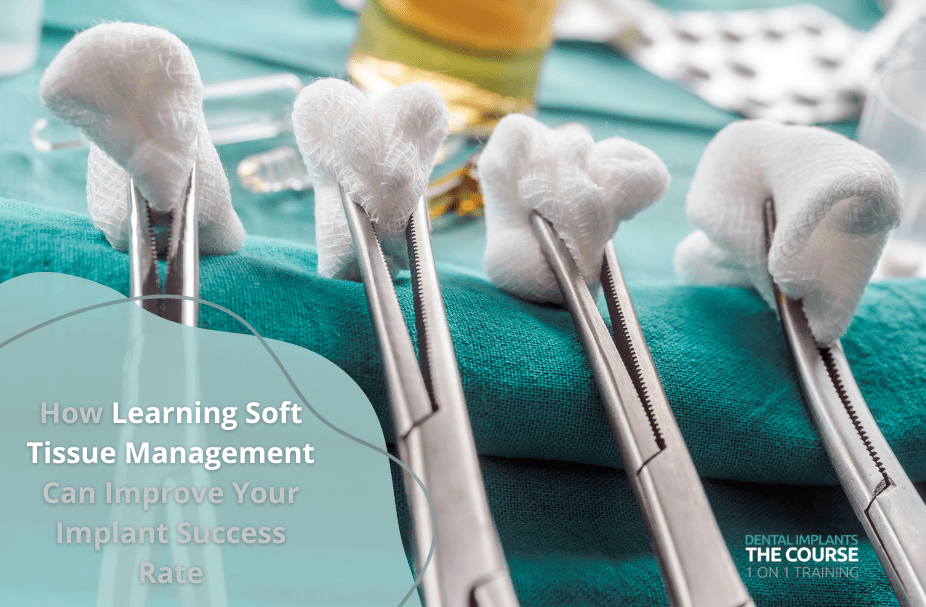
One of the most critical aspects of implantology is soft tissue management. The goal is to create a healthy environment around dental implants, which is essential for the success of the procedure. Given its significance in ensuring long-term implant stability, numerous specialized courses are available that focus specifically on soft tissue management techniques.
Effectively preserving and manipulating soft tissues, as well as augmenting them when necessary, are vital for achieving optimal osseointegration. With the rapid advancements in dental technology, especially in the field of dental implants, it’s crucial for dentists to stay informed about the latest techniques and knowledge that can enhance their success rates.
At Dental Implants The Course, we understand that education in dentistry is a lifelong journey. That’s why we’ve developed a comprehensive guide on soft tissue management in implantology. Join us as we explore this important topic and more!
What Dentists Need to Know About Soft Tissue Grafting Training
Soft tissue grafting is an essential procedure used to address gum recession, insufficient gingival thickness, and aesthetic concerns that patients may want to enhance, such as their smiles. Additionally, it can serve as a preventive measure against periodontal disease.
When seeking soft tissue grafting training, dentists should look for courses that go beyond the basics. These courses should cover everything from accurate diagnosis to the latest techniques in soft tissue management and implantology. Hands-on training with live patients can significantly enhance your success rate. Therefore, selecting a program that allows you to perform soft tissue grafting on your own patients under supervision is highly beneficial.
There are several types of soft tissue grafting procedures, including the tunneling technique and the pedicle graft. Gaining a thorough understanding of each method will equip you with the knowledge necessary for effective soft tissue management in implantology.
Why is Gum Health Important for Implants?
Soft tissue management in implantology plays a crucial role in ensuring high success rates. While osseointegration is essential for implant stability, the health of the surrounding gingival tissue is equally important, as it supports osseointegration and increases the overall longevity of the implant.
Healthy gingiva is essential for achieving a biological seal. This seal creates a tight connection around the implant abutment, which is critical for osseointegration and the overall success of dental implants. It also protects the implant from bacterial invasion, helping to prevent peri-implant disease.
Inflammation in the soft tissue can lead to peri-implantitis, which may result in implant failure. Therefore, early detection and treatment of peri-implant mucositis are key to achieving significantly higher long-term success rates compared to those with poor soft tissue health. This underscores why gum health is important for implants.
How to Improve Implant Esthetics with Soft Tissue Techniques?
Another important aspect of soft tissue management is to improve esthetic outcomes. Clinical evidence suggests that soft tissue augmentation in conjunction with implant placement improves long-term esthetic results and minimizes peri-implant bone loss.
The success of an esthetic implant is based on two main principles: the natural reproduction of the tooth in the crown and the creation of soft tissue that stimulates a healthy periodontium. However, to achieve optimal esthetics, the peri-implant soft tissue must be preserved and/or augmented by periodontal surgical procedures.
A key aspect of implant placement is the use of flap designs that preserve blood supply and minimize tissue trauma.
To enhance implant esthetics with soft tissue techniques, consider the following:
- Select appropriate graft materials based on the specific clinical situation and desired outcome.
- Ensure a high degree of surgical skill and precision during soft tissue grafting.
- Obtain appropriate training and experience to achieve successful outcomes.
Final Thoughts: The Importance of Soft Tissue Management in Implantology
Before choosing a course in soft tissue management in implantology, there are several non-negotiable aspects to consider. For example, choose a program that emphasizes the latest minimally invasive surgical techniques to reduce patient discomfort and recovery time.
It’s also important to stay up-to-date on the latest advances in peri-implant soft tissue management and treatment protocols. Other important considerations include prevention strategies, as well as the identification and treatment of complications associated with soft tissue grafts.
At Dental Implants The Course, our team of dental professionals is dedicated to training you in the latest techniques for soft tissue grafting. Take the next step in your career and discover how to improve implant esthetics with soft tissue techniques and more!
